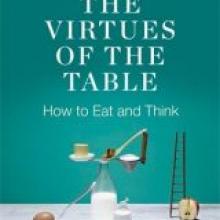
Sometimes unexpectedly he turns them on their heads.
While we may all agree that food should be healthy, sustainable and fair, understanding what this entails is more difficult.
For instance while fair trade is generally a good thing, if it's out-of-season peas or beans flown in from a warmer climate, it may not be environmentally friendly.
Food miles are not necessarily a bad thing if they are low-carbon: from his British perspective he points out that New Zealand can produce some food items and ship them across the world with a smaller carbon footprint than some similar European produce trucked a few hundred kilometres.
In 24 easily digestible chapters about the basic needs to eat and drink he considers our relationships to nature, to our fellow animals and to the unity of our minds and bodies.
He examines why food matters to us and what our relationship to it could or should be. Food is more than fuel; there's a social and psychological side to it too.
Why else would we enjoy a wine more when we know it's expensive than when we think it's cheap?
Or a machine-made capsule coffee when we think it's a barista-made espresso? as he demonstrates, albeit unscientifically.
He advocates scepticism about everything from health advice to advertising, pointing out that many claims are made on too narrow a focus, like the old advice to replace butter with margarine, before they discovered that the transfats in it were worse for health than saturated fat in butter.
Now transfats are mostly removed from margarines.
''Too much received wisdom about good eating is based around a list of foods we should avoid. Knowing how to eat, however, requires knowing about how, rather than what, not to eat,'' he writes.
''Our knowledge is partial and imperfect. The simple act of putting a piece of food in your mouth is related by a complicated network of connections to everything else in your life and the richer that network is, the richer any satisfaction you get from the food will be,'' he concludes.
It's a book to ruminate on, perhaps disagree with in some cases, consider in others and perhaps change some of our buying and eating habits, or at least develop our awareness of where and how our food is produced.
Seasons - By Alison Lambert - Available for purchase now!

The Otago Daily Times and Alison have collaborated to bring you her first cookbook – Seasons.
This book is the ultimate year-round cookbook. Seasons is filled with versatile recipes designed to inspire creativity in the kitchen, offering plenty of ideas for delicious accompaniments and standout dishes that highlight the best of what each season has to offer.
$49.99 each. Purchase here.
$44.99 for ODT subscribers. Get your discount code here.













